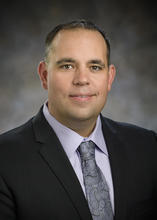Friday, November 17, 2023
8:30 a.m.–1:30 p.m.
Endeavour Room, Student Union
Wright State University Dayton Campus
On this page:
- Workshop Overview
- Schedule
- Session Descriptions
- Speaker Biographies
- Panelist Biographies
- Registration
- Maps and Parking
- Contact Us
Workshop Overview
Join us for a half-day workshop about Artificial Intelligence (AI) and its role in the workplace. This is not just general information about AI—you will begin analyzing the work functions in your business and identify how you can effectively incorporate AI. Examine your own organization carefully. Begin building a pathway to the day when AI will be a vital tool in your future success. Get started by joining your business colleagues November 17 for breakfast, workshop sessions, and a working lunch.
Schedule
| Time | Session or Activity |
|---|---|
| 8:30–8:45 a.m. |
Registration Breakfast Welcome Message |
| 8:45–9:45 a.m. |
Introduction (45 minutes) Legal Session (15 minutes) |
| 10 a.m.–12:20 p.m. |
Workshop Sessions (each session is approximately 40 minutes in length) "How does AI change contemporary work?" by Valerie L Shalin, Ph.D. |
| 12:30–1:30 p.m. |
Panel Discussion and Working Lunch Panel Title: "How AI Changes Work and Workplaces" Panelists:
|
Session Descriptions
How does AI change contemporary work?
We distinguish between different types, capabilities, and limitations of AI with respect to work (e.g., hard vs. soft skills, individual versus collaborative). Discussion highlights the potential gains in efficiency and availability of services while acknowledging the persisting human role in adapting to novelty, respecting guardrails, and facilitating interaction.
Challenges and opportunities of AI: Environmental impact and trust
We will learn about the energy demands of AI systems, recent advancements in eco-friendly algorithms, and the AI community’s commitment to sustainability. We will also emphasize the importance of transparent communication, ethical standards, and reliability for the adoption of trustworthy AI that can team up with humans in a sustainable future.
AI and HR functions: Uses, benefits, and concerns
In this session, we will address ways in which AI might be used in various HR functions—recruiting, selection, training, and organizational change. In addition to describing potential uses, we will address some of the potential benefits (streamlining task completion) and concerns (data accuracy).
Speaker Biographies
Sean Culley, J.D.

Sean Culley, J.D., is the vice president for legal affairs and general counsel at Wright State University. He earned a B.A. from The Ohio State University in 2003 and a Juris Doctor from Capital University Law School in 2006. Before joining the university as associate general counsel in 2018, Culley enjoyed a diverse career spanning solo practice, employment as associate counsel in both large and small firms, representing the State of Ohio as an assistant attorney general, and representing the United States as an active duty Army JAG officer and U.S. military magistrate. As a member of the president’s cabinet, Sean advises and represents the school and its senior leaders on the full spectrum of legal issues encountered by a large public research university. Sean also serves as chair of the university’s policy committee and is monitoring developments in artificial intelligence as they concern the practice of law and organizational policymaking.
Valerie L. Shalin, Ph.D.

Valerie L. Shalin, Ph.D., is a professor of psychology in the human factors area of the human factors/ and industrial/organizational psychology Ph.D. program at Wright State University. She received her Ph.D. in learning, developmental, and cognitive psychology from the University of Pittsburgh. She holds courtesy affiliations at the University of South Carolina in the Department of Engineering and Computer Science, the Department of Psychology, and the AI Institute at the University of South Carolina. Dr. Shalin has been a frequently invited researcher at France’s National Institute for Research in Digital Science and Technology (INRIA-Est). Her scholarly record of over 150 papers in workplace cognition addresses technology design, training, and testing in domains including medicine, space exploration, and disaster response. Her work has been supported by the National Science Foundation, the National Aeronautics and Space Administration, and the Office of Naval Research. She was the recipient of the 2016 Human Factors Prize for her work on Big Data.
Ion Juvina, Ph.D.

Ion Juvina, Ph.D., is an associate professor in the human factors area of the human factors and industrial/organizational psychology Ph.D. program at Wright State University. He earned his Ph.D. in information science from Utrecht University, the Netherlands, and conducted postdoctoral and independent research at Carnegie Mellon University on computational cognitive modeling and behavioral game theory. He holds a courtesy appointment in the College of Engineering and Computer Science. His scholarly record of over 100 papers and presentations is centered around the areas of human-technology-environment interaction, interactive decision-making, and interactive learning. Dr. Juvina has been a proponent of the cognitive architecture approach–a computational modeling approach that emphasizes the need to model the mind as a whole, the mind-environment interaction, and the interdependence between various cognitive mechanisms. His work has been supported by AFOSR, ONR, DARPA, and IARPA.
Debra Steele-Johnson, Ph.D.

Debra Steele-Johnson, Ph.D., is a professor in the industrial/organizational area of the human factors and industrial/organizational psychology Ph.D. program at Wright State University. She received her Ph.D. in industrial/organizational psychology from the University of Minnesota. She also is chair of the Department of Psychology at Wright State. Dr. Steele-Johnson's scholarly record of over 150 papers and presentations has focused on training, motivation, teams, and leadership. As part of that, she focuses on how we can use technology to augment employee outcomes, e.g., through training technology. Her research has implications for individual and team productivity and well-being. She has served on the editorial board of the Journal of Organizational Behavior and on professional committees evaluating dissertation grants. She has consulted with various for-profit and non-profit organizations over the years, e.g., director-level selection and job analysis. Dr. Steele-Johnson’s research has been supported by NASA, AFRL, and NSF.
Panelist Biographies
Alex Gutman, Director of Data Science, Procter & Gamble Company
Alex Gutman, Ph.D., is a data scientist, corporate trainer, and Accredited Professional Statistician® who enjoys teaching a wide variety of data science topics to technical and non-technical audiences. He's a director of data science at The Procter & Gamble Company, author of the book Becoming a Data Head, and an adjunct professor at the University of Cincinnati. Additionally, as a Fulbright Specialist grantee, he has taught data science and machine learning in Kyrgyzstan. He earned his B.S. and M.S. in mathematics at Wright State University and his Ph.D. in applied math from the Air Force Institute of Technology.
Nicholas Kovacs, Talent Consultant, Mix Talent
Nicholas Kovacs, Ph.D., is a talent consultant with Mix Talent. An industrial/ organizational psychologist by training, his expertise in research falls under motivation, resilience, occupational health, and selection. His expertise in practice falls under building and administering selection and development assessments, developing surveys and reports, and conducting analytics using Excel, R programming, and machine learning. Kovacs began his career working within healthcare research at the National Institutes of Health. He has since shifted to a career providing selection and organizational development support for pharma/biotech companies.
Lori Mahoney, Interim Multi-Domain Sensemaking Technology Area Lead, Air Force Research Laboratory Sensors Directorate
Lori Mahoney, Ph.D., provides technical leadership for basic and applied research and advanced development of machine learning techniques for timely high-confidence behavioral and physical knowledge generation from denied and difficult targets using multiple sensors, domains, and algorithm types. Her work encompasses training with limited measured data; performance assessment and modeling; target detection, tracking, and identification; and information fusion and pattern of life algorithms. Prior to joining AFRL in 2022, Mahoney was a research scientist at the National Geospatial-Intelligence Agency from 2008-2022 where she led multiple projects to develop improved algorithms for target detection and sensor tasking as well as tools to augment human decision-making. Mahoney also has 20 years of service in the U.S. Air Force (active duty and reserve) where she held a variety of analysis, research, and leadership positions at both the National Air and Space Intelligence Center and the Air Force Research Laboratory. She is a published author and presenter in national and international peer reviewed journals and forums.
Julio Mateo, Senior Research Scientist, 361 Interactive LLC and Freelance Research and Human Rights Consultant
Julio C. Mateo, M.S., is a researcher, systemic designer, and human rights activist. He is passionate about designing better socio-technical systems that help humans thrive. Mateo has over 15 years of research and development experience, including extensive work to better understand, train, support, and assess complex cognitive skills like systems thinking and cultural competence. Over the past six years, he has become increasingly active in efforts aimed at designing better governance systems that protect human rights and promote justice, democracy, and community well-being. Julio received a Community Impact Award from the City of Dayton’s Human Relations Council in 2018, was recognized by the Dayton Business Journal as one of Dayton’s 40 Under Forty, and was named a Distinguished Hispanic Ohioan in 2019 by the State of Ohio Latino Affairs Commission. Julio earned a master’s degree in human factors psychology from Wright State University in 2007.
Clayton Rothwell, Principal Engineer, Shield AI
Clayton Rothwell, Ph.D., is passionate about human-AI interaction and his career has impacted military, aviation, and healthcare applications of AI technologies. He holds an M.S. and Ph.D. in human factors and industrial organizational psychology from Wright State University. He is a principal engineer at Shield AI, a Forbes AI 50 company in 2023, where he is the human factors lead for Shield's AI pilot and ground control station products. He previously held positions at Infoscitex Corporation and the Ohio State University, leading human factors research.
Registration
Registration for this event includes breakfast, lunch, and all sessions. There are 90 available seats.
Registration costs are as follows:
- Individual: $175
- Group (5 or more from the same company): $25 discount per person
Group registration requires a promo code. To receive this code, please fill out our contact form below, making sure to enter information regarding your group. You will receive the promo code and further registration instructions via email.
Maps and Parking
Wright State University is located at:
3640 Colonel Glenn Hwy.
Dayton, OH 45435
This event will be held in the Endeavour Room in the Student Union building. Parking will be available in Lot 1 near the Student Union.


